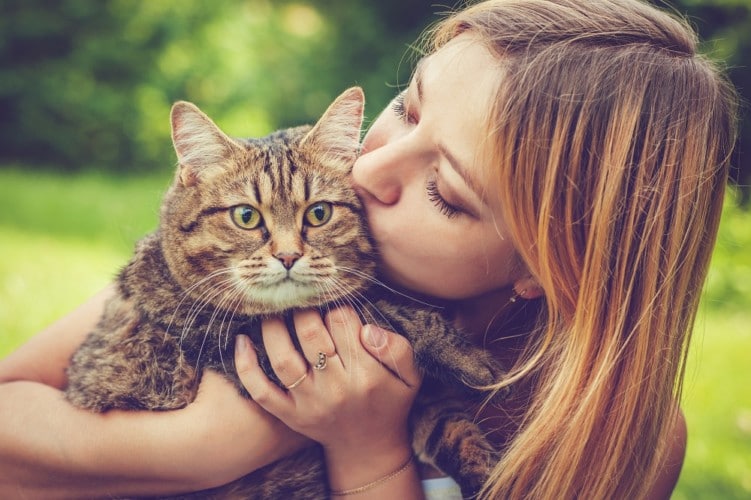
Cats are notoriously plagued by urinary problems. Kidney disease, chronic bladder inflammation, and urethral obstruction are common feline medical conditions, and many owners want to know how they can maintain their cat’s urinary health and keep these problems at bay. Whether your cat has a history of urinary trouble, or you hope to prevent disease development, use these five tips:
#1: Increase Your Cat’s Water Intake
A higher urine water content dilutes the toxins, minerals, and urinary irritants that can lead to problems. Concentrated urine is more likely to form crystals and urinary stones, and irritants can contribute to chronic bladder inflammation. Increasing your cat’s water intake is one of the most important steps toward keeping her urinary tract healthy. More water also means your cat will stay hydrated and urinate more frequently, which will flush out toxins and maintain kidney function.
Try incorporating these ideas into your cat’s daily routine to increase her water intake:
- Fresh water — Cats love fresh water, and your cat will likely drink more if you clean and fill her water bowl daily.
- Canned food — Canned diets contain more water than dry varieties, and feeding wet food is an easy way to incorporate more water into your cat’s daily diet.
- Flavored water — Adding tuna juice or sodium-free chicken broth can tempt your cat to spend more time at her water bowl.
- Fountains — Most cats are drawn to running water, and a battery-operated fountain may be more interesting than your cat’s regular water bowl.
#2: Reevaluate Your Cat’s Diet
If your cat has had previous urinary health problems, she may benefit from one of the many available urinary diets, which contain specific amounts of minerals, protein, and bladder protectants to help maintain a healthy urinary tract. Urinary diets have restricted amounts of minerals, such as magnesium, phosphorus, and calcium, which can contribute to urinary crystal and stone formation. They are also formulated to make your cat’s urine slightly acidic, which discourages crystal formation. Some diets contain glycosaminoglycans, which naturally protects the bladder lining.
Before changing your cat’s diet, consult your family veterinarian. Many urinary diets are available, and she can help you choose one that is appropriate for your cat’s needs. She can also counsel you about gradually changing your cat to a new food so she will accept it. Cats are creatures of habit and may not do well with a sudden switch.
#3: Reduce Your Cat’s Environmental Stress
Cats are sensitive to environmental stressors, which have been linked to inappropriate elimination and feline lower urinary tract disease (FLUTD), a condition that causes chronic bladder inflammation. Affected cats suffer from bladder pain and are at risk of developing a life-threatening urethral obstruction. Environmental changes, such as a new roommate or baby, a new pet, or a different litter brand, can trigger internalized stress that manifests as urinary problems.
Eliminating simple stressors and providing an escape when your cat is fearful or anxious can keep her urinary tract healthy, so try these stress-reducing tactics:
- Scoop litter daily — Some cats hate a soiled litter box and refuse to use dirty litter, so keep your cat’s box as clean as possible.
- Don’t switch litter brands — Cats can be picky about their litter, and a sudden brand change may prompt her to use your floor instead of the new, flower-scented brand in her box.
- Provide a refuge — Your cat will appreciate her own space, particularly if your home contains rowdy children or other pets, or she is timid and enjoys time alone. Choose a quiet, low-traffic area of your home and include all your cat’s necessities—food and water bowls, litter, a scratching post, a perch, and toys—so she can get away and de-stress when she feels the need.
- Add feline pheromones — Feliway® products contain feline pheromones that reduce stress and encourage calmness in cats. Add diffusers to home areas where your cat spends most of her time, and spray her blankets and bedding. Houseguests can also be sprayed to make new introductions less stressful.
#4: Provide Environmental Enrichment for Your Cat

An indoor life is safest for your cat, but a bored cat more likely will develop stress-related urinary conditions. Cats are natural predators, and your cat will enjoy toys and interactions that bring out her inner lioness, such as:
- Perches — Cats love to safely watch household activity from above, and an elevated perch, such as a cat tree, can provide her hours of entertainment. She may also love a window perch that will let her observe the birds and squirrels in your backyard.
- Videos — Videos of mice scurrying or birds flying can keep a bored cat entertained while you are at work, or busy with household chores.
- Food puzzles — In the wild, cats hunt for their food. Making your cat work for her dinner will appeal to her primitive side, and the added activity will help her stay fit. You can purchase food puzzles for hiding food, or you can simply hide pieces of food around your home and let your cat’s nose lead her on a hunt.
- Moving toys — Your cat may love to chase battery-operated toy mice or insects zooming around the floor. A feather on a string can keep her moving and entertained, as well.
#5: Schedule Regular Veterinary Appointments for Your Cat
Cats need regular veterinary care, and your family veterinarian can detect signs of underlying urinary conditions during your cat’s annual wellness visit. Cats over 8 years of age should see a veterinarian more frequently to maintain good health. A urinalysis can be performed at each visit to analyze your cat’s urine for signs of inflammation, infection, and kidney dysfunction. Blood work will evaluate your cat’s kidney function, and can detect kidney failure, a leading cause of death in cats, in its early stages when treatment can be helpful.
If you have questions about your cat’s urinary health, speak with your family veterinarian. If your cat has been diagnosed with a urinary condition that requires specialty care, contact us to speak with our internal medicine department.
- Gastrointestinal Foreign Body by Jeremy Fleming, DVM, DACVS-SA - March 24, 2025
- Angular Limb Deformity by Russell Kalis, DVM, DACVS-SA - November 18, 2024
- Caustic Substance Injury by Jami Becker, DVM, DACVECC - September 30, 2024

